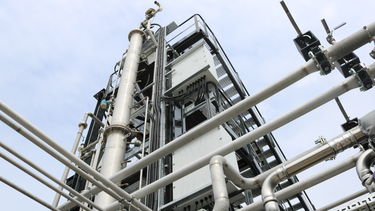The UK Carbon Capture and Storage Research Community Network+ (UKCCSRC) has awarded funding to 13 cutting-edge projects through their Flexible Funding 2023 call.
Carbon capture and storage (CCS) is essential for achieving net zero greenhouse gas emissions and avoiding dangerous climate change. Research to make the technology more effective, safer and cheaper is constantly taking place in universities, businesses and research facilities around the UK.
Professor Jon Gibbins, UKCCSRC Director and Professor of Power Plant Engineering and Carbon Capture in the Department of Mechanical Engineering at Sheffield, said: “This UKCCSRC Flexible Funding round will be tackling a wide range of projects suggested by the needs of the UK's growing CCS deployment sector. As this call was well-subscribed, and there is clearly a major opportunity for us to help build UK CCS wealth-creation capacity in CCS using this route, the UKCCSRC, with its proven track record of rapid and effective project procurement and funding, is actively seeking additional funds for future calls.”
Dr Abby Samson, Lecturer in Fuels and Combustion in Mechanical Engineering at Sheffield, commented; "this project will grant us more insights into amine thermal reclaiming and importantly, will utilise samples from an industrial unit that will contain entirely realistic mixtures of degradation products from operation over extended periods of over a year, on gas turbine flue gases."
CCS researchers are passionate about preventing the climate crisis. “Research on CCS lets me apply my dual passions for climate action and environmental engineering,” says Dr Lee Hosking, from Brunel University London. Jiacheng Sun, from the University of Edinburgh, works in CCS “because by capturing and storing carbon emissions from various sources, we can help reduce the buildup of greenhouse gases in the atmosphere and slow down global warming, ultimately safeguarding our planet's future for generations to come.”
Several of the funded projects focus on the knowledge and technical developments required for safe carbon dioxide storage deep underground. Professor Sophie Nixon, at the University of Manchester, is leading a project which “will take the first steps to assess what native microbiota live in the reservoirs targeted for CCS, and how they may respond to CO 2
storage”, while Dr Yihuai Zhan, from the University of Glasgow will utilise “cutting-edge X-ray imaging to understand, at a micro-level, how CO 2 interacts with carbonate rocks when injected deep underground.”
Dr Emma Michie, from the University of Liverpool, will use her background knowledge in structural geology to increase our knowledge and confidence in assessing the validity of CO 2 storage sites, by analysing surface samples from the Central and Northern Apennines, Italy, and subsurface samples from Norwegian North Sea.
And the project led by Dr Marius Dewar at the Plymouth Marine Laboratory will focus on safety once the CO 2 is stored by “providing CCS operators with tools to develop cost effective monitoring programs that can provide assurance to stakeholders (public, operators and regulators) that the storage site is secure, and that sensors are located in the best positions to detect any anomalies that may occur.”
A total of £365,102 was awarded to the projects, which all support the UK Government’s net-zero objectives and will last between 3-9 months. The UKCCCSRC is able to fund these projects thanks to their ongoing funding support from the EPSRC.

